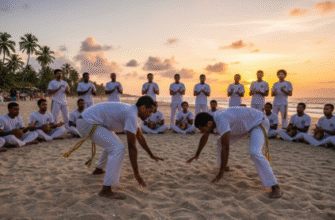There’s a moment that strikes many travelers. You’re standing in front of a stunning landmark, camera in hand, but a nagging feeling creeps in. You’ve seen the sights, tasted the food, and bought the souvenirs, yet you feel disconnected, like you’ve only skimmed the surface of a place. This feeling is the seed from which a powerful idea grows: the desire to travel with purpose, to give back, and to engage with the world on a more profound level. Volunteering abroad isn’t just a trip; it’s an exchange, an education, and an opportunity to be part of something bigger than yourself.
But what does it truly mean to “make a real difference”? The phrase is often romanticized, conjuring images of single-handedly building a school or saving an endangered species. The reality is far more nuanced and, frankly, more meaningful. A real difference is rarely loud or dramatic. It’s in the daily interactions, the sharing of skills, and the support of long-term, locally-driven initiatives. It’s about understanding that your primary role is not to be a savior, but a supporter, a student, and a partner. The most successful projects are those that empower the community to continue the work long after the volunteers have gone home. Sustainable impact is the ultimate goal, not short-term fixes that fade away.
Finding Your Purpose: How to Choose the Right Volunteer Project
The path to a meaningful volunteer experience begins long before you pack your bags. It starts with introspection and diligent research. With thousands of organizations offering placements, finding the one that aligns with your values and skills can feel overwhelming. Breaking it down into key areas can help you navigate the options and find a project where you can genuinely contribute.
Follow Your Passions and Skills
The most effective volunteers are those who are genuinely engaged in their work. Think about what you love to do and what you’re good at. Are you passionate about environmental conservation? Projects involving reforestation, wildlife monitoring, or marine conservation could be a perfect fit. If you have a knack for teaching or working with children, you could support under-resourced schools or community centers. Do you have practical skills in construction, healthcare, or technology? These are often in high demand. Don’t underestimate your “soft skills” either. Patience, creativity, and strong communication skills are invaluable in any volunteer setting. Choosing a project that taps into your existing abilities and interests ensures that you’ll not only be more effective but also find the experience more personally fulfilling.
Become a Research Expert
This is arguably the most critical step. A reputable organization will be transparent, ethical, and focused on the community’s needs, not just on creating an “experience” for volunteers. You must investigate potential organizations thoroughly. Ask critical questions: Where does the program fee actually go? A good organization will provide a clear breakdown of how funds are used for project costs, local staff salaries, and administration. Are they partnered with local organizations? Genuine partnerships with community leaders are a sign that a project is built on a foundation of respect and collaboration. What do past volunteers say? Look for reviews on independent platforms, not just the testimonials on the organization’s website. A lack of transparency should be a major red flag.
Always verify the legitimacy of a volunteer organization. Look for clear financial reports, long-standing relationships with the host community, and detailed project goals. Ethical programs prioritize the dignity and needs of the local population above all else. They focus on skill-sharing and capacity building, ensuring the project’s benefits endure.
Consider the Commitment
The duration of your stay can significantly influence your impact. While short-term projects of one or two weeks can be beneficial for specific, task-oriented goals (like a building blitz or a special workshop), longer-term commitments often allow for deeper immersion and more substantial contributions. It takes time to build trust, understand cultural nuances, and become a truly effective member of a team. A longer stay allows you to move beyond being a visitor and become part of the community, fostering a richer and more authentic cultural exchange.
The Reality on the Ground: Expectations vs. Experience
Volunteering abroad is not a vacation. It can be challenging, uncomfortable, and emotionally taxing. It’s also incredibly rewarding for precisely these reasons. Going in with realistic expectations is key to a successful experience. You might be living in basic conditions with limited amenities. You will almost certainly face a language barrier. You will be confronted with cultural norms and ways of life that are vastly different from your own. This is not a negative; it is the very essence of the experience. It’s an invitation to step outside your comfort zone, to become more adaptable, resilient, and open-minded.
Your role might not be what you initially imagined. You might spend days on tasks that seem mundane, but are essential to the larger project. The pace of work may be slower than you’re used to. Flexibility is your greatest asset. The ability to listen, learn, and adapt to the needs of the moment is far more valuable than rigidly sticking to a preconceived plan. Embrace the challenges as part of the journey. These are the moments that foster the most significant personal growth.
The Lasting Impact: How the Experience Changes You
While the goal is to contribute to a community, one of the most undeniable outcomes of volunteering abroad is the profound impact it has on the volunteer. You return home with more than just photos and memories; you return with a new perspective. You develop a deeper understanding of global issues and a more nuanced view of the world. You learn to communicate across cultural divides, solve problems with limited resources, and navigate unfamiliar environments with newfound confidence.
This transformation extends into all areas of your life. Employers value the resilience, cross-cultural communication skills, and independence gained from such experiences. You may discover a new career path or a lifelong passion you never knew you had. Most importantly, you build human connections that transcend borders. The friendships you forge with fellow volunteers and community members are a powerful reminder of our shared humanity. Making a difference abroad is a two-way street; you give your time and energy, and in return, you receive an education you couldn’t get anywhere else.








